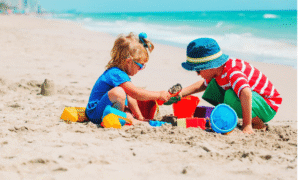How can you best prepare your child for the excitement that comes with the end of school year and changes in routine?
With all of the new fast paced environments and activities that come along with summer, unique challenges can pop up that may cause your child to become overwhelmed with all of the sensory input around them. Activities that incorporate sensory inputs like water being splashed on them at the pool, loud music at concerts, sand at the beach, or other kids bumping into them at a carnival can lead to a sensory overload and negatively impact your family’s summer time experiences.
Be prepared with these tips and strategies to help your child fully participate and thrive in these summer activities and adventures!
_____
At the Pool or Beach

- If your child has a difficult time tolerating sand on them, look for an anti-sand sunscreen to easily brush sand off (baby powder can also do the trick!). Wear water shoes instead of sandals to diminish the feeling of sand on bare feet or have a bucket of water set up so that your child can easily rinse sand off of their arms and legs.
- Introduce sand at home before going to the beach! Have your child play with a small bin of sand at home before going to the beach so they know what to expect. Take small steps with sand and make it fun.
- Play in a baby pool away from the ocean to enjoy the water if the crashing waves are too overwhelming (or unsafe) for your child.
- Provide calming sensory strategies by giving your child a full body squeeze while applying sunscreen, wrapping them tight in a beach towel like a burrito, or having them carry a heavy beach bag from the car to the beach!
- Have your child wear a long-sleeved swim shirt if they are sensitive to the texture of sunscreen being applied or the feeling of water being splashed on them at the pool.
Fireworks

- Use noice cancelling headphones or earplugs to reduce the loud and startling sound of fireworks.
- Watch the fireworks show from a distance. Find a spot where your child can relax in their own personal space to watch the show instead of in the overwhelming crowd.
- Try a smaller, more local firework show to decrease the size of the crowd, or grab small and safe fireworks to set off in your own backyard so that your child has the comfort of their own environment to help regulate while fireworks are going off.
- Find a live stream of the firework show to watch on a computer or TV to enjoy it from the comfort of your home, allowing you to control the volume of the fireworks so that your child does not get overwhelmed by the auditory input.
- Be prepared with sensory calm down strategies (e.g., deep breathing, weighted blanked, body squeezes, etc.) to help your child regulate if they become overwhelmed.
Events with Large Crowds

- Prepare your child for what to expect. Talk about what is going to happen at the event and help your child problem solve reactions to potential triggers ahead of time.
- Create a clear and organized schedule of activities with your child so that they are prepared with what to expect at the event. Allowing them to participate in making the schedule can help to promote motivation to follow it when at the event.
- Have a bag prepared with calming sensory materials to help your child regulate with all of the environmental sensory inputs. You can pack ear plugs or headphones for the sounds, sunglasses to help diminish excess visual inputs, fidget toys, a favorite stuffed animal, crunchy snacks, or chewing gum (if appropriate).
- If you see your child starting to become overwhelmed and dysregulated, find a quiet and calm spot to take a break and use some sensory strategies to help your child regulate. It’s better to act proactively when you are starting to see early signs of dysregulation instead of waiting until they potentially escalate further.
Vacations with Long Road Trips or Plane Rides

For children that seek sensory input, long car rides or plane rides with limited opportunities for movement can be tricky. Try these tips for ways to gain regulating sensory input throughout your trip:
- Engage in a movement activity right before the car/plane ride. Do animal walks in the airport or an obstacle course in your yard/living room right before getting into the car to help your child gain regulating inputs.
- Take breaks! If taking a long road trip, break up the car ride with simple movement activities every couple of hours (e.g., jumping jacks, animal walks, yoga poses, etc.). Plan out your stops in advance to try to find local parks, playgrounds, or large grassy areas to run.
- Provide sensory input throughout the trip. Put together a few toys such as fidgets, vibrating or weighted stuffed animals, pin art hand board, etc.
- Put a wobble cushion/pillow at your child’s feet so they can wiggle or stop their feet throughout the drive to gain sensory input (make sure to follow manufacturer guidelines regarding car seat safety if your child is still in a car seat).
_____
How Can We Help?
Our licensed occupational therapists are trained in sensory processing and modulation. If you have concerns about your child’s ability to regulate, handle changes in routine, or navigate busy environments, we can help! Contact us at (203)828-6790 to schedule an occupational therapy evaluation or free phone screening today!


